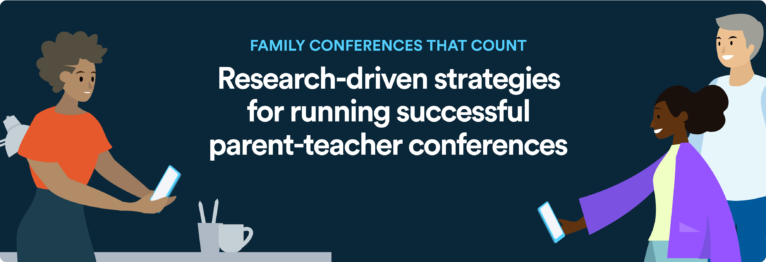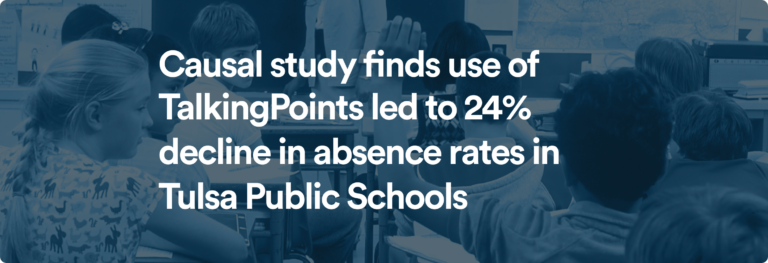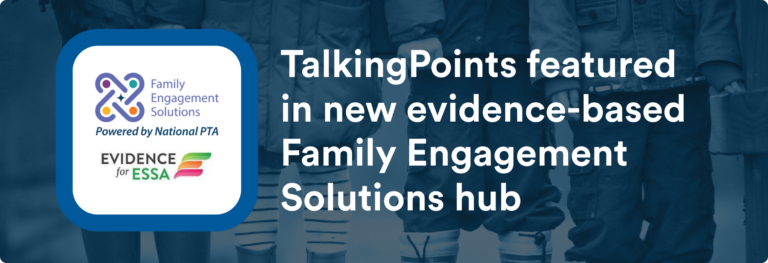Written by Paige DeLozier
Rethinking parent-teacher conferences
One of the amazing things about American education is that conferences are portrayed as informational meetings for students’ families to learn their current academic standing. That’s it. One-way. There has not been much discussion in teacher training around whether that is the most efficient or beneficial way to utilize this limited time with families. Maybe it is time to change that.
Making the most of parent-teacher conferences
As the first quarter of the school year winds down, teachers are preparing for their first round of family conferences and TalkingPoints has some key data to share that will help guide new, insightful conversations.
As a mission-driven non-profit organization, TalkingPoints conducts research to identify best practices in school-family engagement to support teachers, schools, and districts in achieving their student academic and well-being goals. In the Spring of 2022, Kevin Fosnacht, Ph.D., Senior Research Associate at TalkingPoints, conducted an Impact Survey that uncovered some untapped opportunities to bridge the gap between what families want and need to know from teachers, and what teachers need to know from families to best support students. Let’s take a look.
What do families want to know?
According to our survey of English and Spanish-speaking families across early childhood, elementary, middle, and high school students, conferences that focus mainly on academics serve their needs pretty well. The top three areas that families wanted to learn more about were their child’s academic progress, behavior, and missing homework.
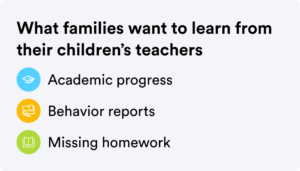
Families want to ensure their child is succeeding academically and, with this in mind, they want to know that their child is meeting behavioral expectations so that they can make progress throughout the school year. Teachers can support this by coming to the conference prepared with examples of each student’s academic strengths and areas for growth, and some behavior notes for each student.
What do teachers want to learn?
One finding from the research was that teachers wanted more insight into student home life and any circumstances that could impact classroom behavior and learning. The top three areas teachers wanted to learn more about from families were social-emotional challenges, important family circumstances, and behavioral challenges.
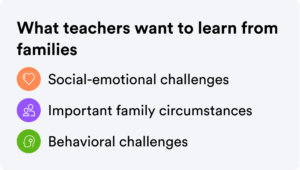
Using conference time to learn about out-of-classroom circumstances gives families a chance to be the expert on their child while shining a light for educators on what makes each child tick. Circumstances at home and social-emotional challenges can have significant influence on a child’s growth and learning, and taking time to explore these themes can help create productive partnerships between the family and the teacher that in turn can benefit the student.
For teachers: Preparing for a successful family conference
Now that we know the best areas of focus for an ideal family conference, what would it look like? Here’s an idea based on Dr. Fosnacht’s research results and a 30-minute conference schedule you can adjust based on what your own schedule allows.
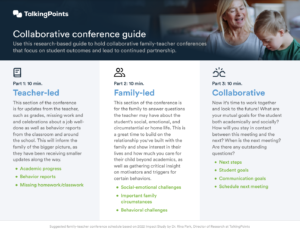
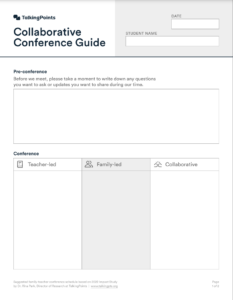
Successful conferences: Encouraging attendance and helping families prepare
Many families may not be sure what to expect from conferences with the teacher or what their role should be. Teachers can help lay the groundwork for a successful session by sending information ahead of time letting families know what to expect and encouraging them to think about the questions they want to explore.
Sometimes in preparing for successful conference meeting the question teachers find themselves asking isn’t “What will this student’s family want to talk about?” but rather, “Why can’t I get families to attend conferences?”
It might sound like a lofty goal, but having 100% attendance for family conferences is possible. How do we know? Because it’s been done.
Wendy Young, a 5th grade teacher in Fayette, Kentucky, used TalkingPoints to stay in contact with all of her students’ families throughout the school year. With a combination of those meaningful messages and an offering of in-person or virtual meetings, she was able to have a conference with every single family she needed to! That’s not all…she had 100% attendance at parent-teacher conferences, twice a year, for two years in a row. And she attributes that to the conversations and relationships she built through TalkingPoints.
Hear her whole story on this episode of the EdCuration Podcast.
Families are teachers’ partners in each student’s educational journey, and conferences offer a valuable opportunity to form and deepen relationships with families for the benefit of students. Let’s make every moment count and every voice heard. Let us know what tricks you have for successful parent-teacher conferences by tagging us on Twitter @TalkingPointsEd or with the hashtag #TPFamilyConference.
Click here to download your own TalkingPoints quick-guide and click here to download the Collaborative Conferences Worksheet.
To hear a conversation about how to drive momentum with families post-conference, watch this webinar we collaborated with Wendy L. Young and edWebinar on 10/24/23.
